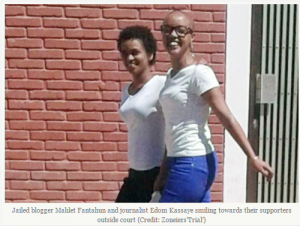Ethiopian Zone 9 Bloggers Arrested For Criticizing The Government
Technology and more specifically the internet has opened a whole new realm where there is to a greater extent, free flow of information. Government around the world have embraced the internet as a double-edged sword; one that can be used to promote government activities and one that can quickly highlight the government’s shortcomings.
On paper, Ethiopia is hailed as being a multiparty democracy but in reality one political party control just about all the seats in Parliament with the exception of one seat. The only telecommunication infrastructure in the country is run by the government and is ranked among Africa’s most deplorable infrastructures. Internet usage nationally stands at about just 2% of the entire population. The Ethiopia Government seems to be doing a good job blocking out the external world from the activities going on within that country. Any information from the country are expected to be from government run installations, and thus their independence and integrity remains in question.
Well, this was about to change when a group of nine young and university-educated local professionals from a somewhat privileged urban background came together back in 2010 for the purpose of raising funds for charity. One thing led to another, and the nine professionals decided to start a blog post where they will highlight matters touching on social and civic challenges being faced in Africa’s second-most-populous country.
Soliyana Shimeles, 28 and a Co-Founder of Zone 9 blog says, “Initially, it was not about political activism or about criticizing the government. It was to connect with like-minded people.”
These bloggers are from the generation that rose after the Marxist dictatorship was overthrown back in 1991. Somewhere along the line, their blogs started to become more of an avenue for raising awareness about the political and social challenges facing Ethiopian people. They became online activists calling on Ethiopian youths to demand their rights as outlined in the country’s Constitution and the democracy that the Ethiopian government had promised the people.
In 2009, the Ethiopian government passed a very controversial anti-terrorism law that is now being used to criminalize the activists’ noble cause. Over the decade, the government, which control the main media outlet in the country has been warm and cold towards free political discourse as and when it suits. In the run-up to the 2005 General Elections, the Ethiopian had a relatively open climate that saw the opposition win about a third of the seats in Parliament; made up 547 members. After the elections, the government conducted massive arrest of opposition politicians and even student protesters. Several years down the line, several newspapers and magazines have been closed down.


The Zone 9 bloggers’ attorney says so far there has not been any evidence presented incriminating them. Western countries and human right organizations have criticized the Ethiopian government over that arrest.
The Ethiopian government maintains that the bloggers attempted to sabotage the state. An adviser to the Government Communication Affair Office, Ganenu Asefu was quoted saying, “None of them were arrested for what they wrote.”
Although the country has registered double-digit economic growth over the last five years, a big part of this development is attributed to the government’s intervention in the economy backed by massive public investments. However, the country’s judicial system still has a long way to go; it was rated 2.9 out of a possible 7 in a recent survey done by the World Economic Forum. The country’s ruling political party, the Ethiopian People’s Revolutionary Democratic Front pays deaf ears to any criticism on the political system.
You can read more on the arrest of the six blogger and the arrest warrant for Soliyana Shimeles and others who are still outside the country, by following this link.




